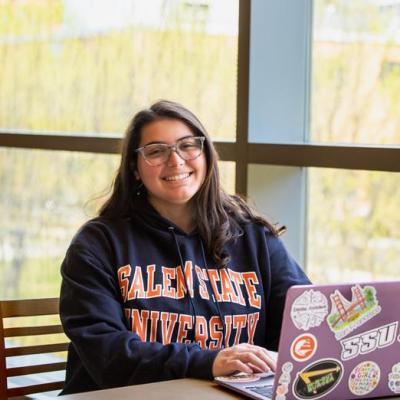General Education at Salem State is YOUR Gen Ed QUEST

What is the SSU Gen Ed QUEST?
The SSU Gen Ed QUEST is the central and unique SSU experience shared by all students. It allows you to shape 1/3 of your college coursework in order to build skills and knowledge for the 21st century that align with and expand your personal and professional goals.
No matter your major course of study, after completing the various stages of the SSU Gen Ed QUEST, you will be prepared to:
- Question in many ways and in many settings.
- Understand your and others’ identities and how society and contexts shape them.
- Explore the world at large and the various areas of human activity and ways of knowing.
- Share by learning to communicate effectively with different audiences, using a variety of tools in a range of settings.
- Take Action by putting your knowledge into practice on campus, in the community, in your own life and for a just and democratic society.
Why (do I have to complete) Gen Ed QUEST courses?
- Creates a shared SSU experience and is the heart of the SSU identity
- Allows you to shape 1/3 of your academic experience in college
- Develops broad understanding and skills across many areas, which is the hallmark of a college education
- Expands your capacity to be an ally and advocate for social justice
- Makes it possible to understand subjects more deeply by examining them from different disciplines and perspectives
- Fulfills the requirement to receive a bachelor’s degree in Massachusetts
Benefits of the Gen Ed QUEST
You will benefit more from your education. Gen Ed QUEST courses invite you to create a framework for meaning-making in all areas of your life. QUEST Integrative learning sets you up to learn about yourself, identify and develop your strengths, and be successful at solving unscripted and often complex real-world problems in life and at work.
Your future boss will value your education more. According to Harvard Business Review, “80% of employers agree that all students need a strong foundation in the liberal arts and sciences.” Employers seek broadly educated candidates who are flexible, critical and creative thinkers and change-makers.
Your community will benefit more from your education. Public university graduates enrich their communities’ civic and economic life through family support, volunteer work, leadership, and philanthropic contributions. The general education curriculum prepares you to cultivate interests and develop skills that will enable you to speak for yourself, help lift others and be an effective and informed advocate for yourself and for historically-marginalized people.
How and when do I complete my Gen Ed QUEST courses?
You complete your Gen Ed QUEST over four years. Gen Ed QUEST courses do not slow down your progress towards your degree.
You select classes that fulfill a set of dynamic categories and broad thematic areas. Gen Ed QUEST courses are distinct from courses in your major, though some may be applied as support courses in your major area of study. There are multiple courses to choose from in each category. You are in charge.
- First year: explore and build foundations in all Gen Ed QUEST areas
- Second and third year: continue to expand in all Gen Ed QUEST areas, choosing courses based on your interests and curiosity
- Fourth year: complete final Gen Ed QUEST requirements
The Gen Ed QUEST categories
First Year Seminar (FYS)
Oral Communication (OC)
Writing 1 (WI)
Creative Expression and Appreciation (CEA)
World Cultures (WC)
The Human Past (HP)
Quantitative Reasoning (QR)
Scientific Reasoning (SR)
Scientific Reasoning Lab (SRL)
Contemporary Society (CS)
Personal Growth and Responsibility (PGR)
Diversity, Power Dynamics, and Social Justice (DPDS)
Written Communication 2 (WII)
Written Communication 3 (WIII)
Program Area for General Education (PAGE)
A Program Area for General Education (PAGE) was created by the President of Salem State in April 2024. The Program Area for General Education (Gen Ed) will play a key leadership role in ensuring the success of all undergraduate students in the shared curriculum of Salem State University. For more detailed information about General Education language, requirements, and resources, please refer to the PAGE SharePoint site.
